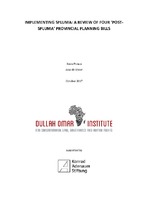Implementing Spluma: A review of four ‘Post-Spluma’ provincial planning bills
Abstract
Between 2015 and 2017, municipalities across the country developed municipal planning bylaws.
Many municipalities were assisted by national government and/or provincial
governments. The involvement of both the national and provincial governments was mainly
driven by the aim of ensuring that the transfer of power to municipalities occurred in an
orderly fashion (see the research report De Visser & Poswa (2017) Implementing SPLUMA: a
Review of Municipal Planning By‐laws). More importantly, this was to ensure that
municipalities have the necessary local legislation in place to perform their municipal planning
function. The scope of the function expanded dramatically as a result of judgments of the
Constitutional Court and the Spatial Planning and Land Use Management Act of 2013
(SPLUMA).
SPLUMA is a framework law that does not set out in detail what municipalities have to do in
order to effectively execute their municipal planning function. Each province is empowered
by the Constitution to pass provincial planning laws to further regulate municipal planning in
that particular province and also to regulate the provincial government’s own planning. At
the time of writing, it was only the Western Cape that had made use of this constitutional
power in the ‘post‐SPLUMA’ era. It is unclear whether the other provinces will complete the
planning architecture envisaged by SPLUMA by passing provincial planning legislation. Some
may find it sufficient to have SPLUMA and the municipal by‐laws govern planning in their
respective provinces without provincial law being the intermediary law.

